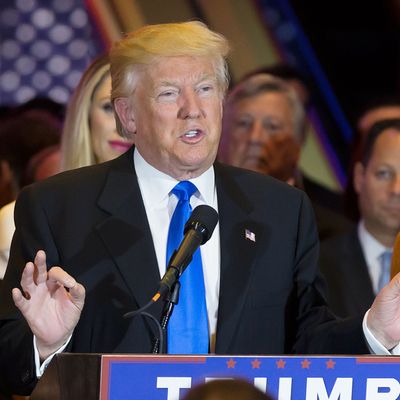
On Thursday, Donald Trump scored a big public-relations victory, which may prove to be the first step on a road to widespread corporate blackmail and systemic corruption, a long-term pattern in which Trump camouflages his Wall Street agenda with small-scale gestures of populist beneficence — or just a somewhat more secure and happy period in the lives of a bunch of manufacturing workers in Indiana.
To be more concrete: Carrier, a company that makes air conditioners and the like, announced earlier this year that it planned to shut down two of its facilities in Indiana and shift their production lines to Mexico. Carrier did not pursue this move out of financial necessity, but just to increase their medium-term profitability by a little bit.
For a right-wing populist running a campaign against bad trade deals — particularly ones involving Mexico — this was a tremendously useful story. And so Trump made keeping the Carrier plants in Indiana one of his campaign’s clearest promises.
For the past couple of weeks, Trump periodically tweeted about his frenzied efforts to convince Carrier’s senior management not to turn their backs on the Hoosier State. And this week, the president-elect reached a deal with the company, in which Carrier will receive $7 million in tax incentives from Indiana on the condition that it keep one of its facilities in the state, while also investing $16 million into that facility over the next two years. The deal is expected to save more than 1,000 jobs at the plant, and possibly more in the surrounding community, where restaurants and stores profit off the patronage of those manufacturing workers.
Carrier will still be shifting production out of its other Indiana plant, which employs roughly 700 people.
There are a lot of questions swirling around this story. Among them: Did Carrier cut this deal because its parent company was afraid of losing federal contracts? If so, does that mean Trump will use the coercive power of such contracts to pick winners and losers in the economy on the basis of political expediency — or something far more malignant than that? Will this inspire a wave of companies to threaten to leave the country in search of tax incentives? Or is this just a harmless little one-off stunt that has the effect of making a major, positive difference in the lives of one Indiana community?
But on one key question — that of Donald Trump’s primary motive for pursuing this unorthodox deal — we appear to have a definitive answer. Or, at least, we have an official answer. Per the Washington Post:
Trump said he called up Gregory Hayes, chief executive of Carrier’s parent company, United Technology, after watching a nightly news report about Trump’s campaign promise to keep the plant open. Trump said at first he did not recall the statement, then said he had not intended it to be taken literally. But the broadcast moved him to take action.
“I said, Greg, you gotta help us out here. You gotta do something,” Trump recalled Thursday.
So: According to the president-elect, the story here is that he improvised some nice-sounding populist baloney, realized that cable news was taking it seriously, and begged Carrier to help him save face.
Now that Trump has actually won the presidency, it’s hard to keep characterizing his victories as random accidents — moments when a garbage fire just happened to be in the right garbage place, at the right garbage time.
So maybe Trump is lying about the origins of the deal and simply recognized a useful political prop and then leaned on it as hard as he could. But if that’s true, we return to a whole new set of questions: Why would he tell a national newspaper that he never intended his promise to be taken literally? Why would he portray himself as desperate, powerless phony begging a CEO to bail “us” out (in a context where us seems to refer to his political team, not the people of Indiana)?
Trump’s America is a disorienting place.






























